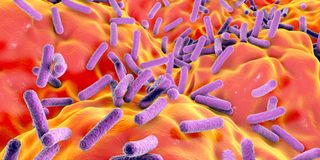Endometriosis is notoriously difficult to diagnose. Now, scientists have developed a new way to diagnose the condition – by looking for a unique collection of metabolites in poop that can be detected with a simple test.
These metabolites are made by microbes in the intestines as their metabolic products when bacteria digest the food we eat. Other metabolites released by gut bacteria get in the way digestive system and they end up in our feces, which means they can be found in a stool sample.
Scientists had it earlier be identified link between unique changes in the gut microbiome – the community of microbes in the colon – and endometriosis, a debilitating disease in which tissue lining the uterus grows anywhere in the body. Endometriosis can cause chronic pelvic pain, inflammation and infertilityand historically the disease has been difficult to diagnose.
Related: Endometriosis can increase the risk of cancer four times, according to research
In the new study, published Friday (Oct. 11) in the journal Byresearchers have shown for the first time that a unique signature of metabolites in poop can be used to accurately diagnose the disease. The hope is that one day such a test can be included in the endometriosis diagnostic process.
Although the test will not replace regular screening procedures, it can provide an easy way to diagnose endometriosis before committing to an invasive surgical procedure. .
“When women suspect that they may have symptoms of endometriosis, they can take this non-invasive test and be sure that ‘OK, I could have this disease,'” Rama Kommaganico-author and associate professor of pathology at Baylor College of Medicine, told Live Science.
In America, it currently takes an average of 11 years for people with symptoms of endometriosis to be checked. Some of the symptoms of this condition are not obvious, which means that they appear in many other diseases. For example, chronic pelvic pain can also occur in situations such as fibroids or pelvic inflammatory disease.
The process of being diagnosed with endometriosis usually starts with doctors taking a complete medical history of the patient and perform a complete physical and pelvic exam. They may also choose to do an ultrasound or magnetic resonance imaging (MRI) scan. However, the only way to diagnose the condition is through keyhole surgery known as laparoscopy.
A stool test can simplify this difficult process. To see if such a diagnosis is possible, researchers compared metabolites and bacteria found in stool samples from 18 women with endometriosis and 31 women without the condition.

They found that people with endometriosis had lower levels of “good” bacteria in their stool than people without the condition. These include Roseburia bacteria, for example, which have been shown to contain anti-inflammatory properties.
The researchers also found that the metabolites in the poop of women with endometriosis were significantly different from those in samples from those without the condition. In particular, one bacterial metabolite called 4-hydroxyindole was present in significantly lower levels in stool samples from women with endometriosis than those without.
In separate experiments, the team transplanted cells from endometriotic cells into mice, successfully giving the mice the disease. When scientists injected mice with 4-hydroxyindole, they found that the metabolite reduced the growth of endometriotic cells. At the same time, conditions a inflammation and the pain associated with the disease descended into the mice. This suggests that 4-hydroxyindole may have some protective role against the disease – but this effect needs to be confirmed in human studies.
If similar patterns are observed in humans, it is possible that low levels of 4-hydroxyindole could be used to diagnose endometriosis, while somehow supplementing the metabolite could treat it, Kommagani said.
Kommagani and colleagues are now working with commercial partners to evaluate the safety and efficacy of 4-hydroxyindole as a potential drug to treat endometriosis. In addition, the researchers are already conducting a stool test based on the findings of their study, and they intend to test it in a clinical trial.
The current study only looked at a small number of people with endometriosis, so the next important step is to determine whether the results can be generalized to the general population.
If everything goes wrong, the team hopes to make such a test available to patients within the next two to three years, with the aim of releasing the test for home use, Kommagani said.
Always ask yourself why some people build muscle more easily than others or why spots appear in the sun? Send us your questions about how the human body works community@livescience.com with the subject “Health Desk Q,” and you can see your question answered on the website!
#Scientists #working #poop #test #endometriosis